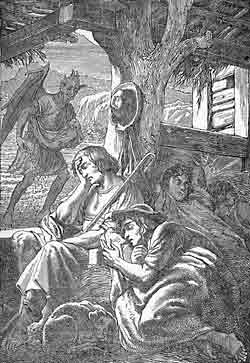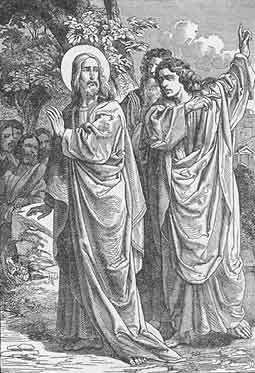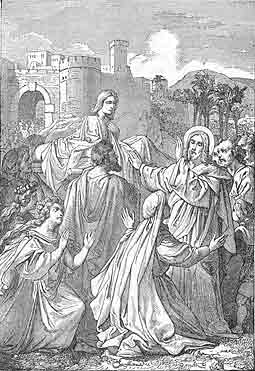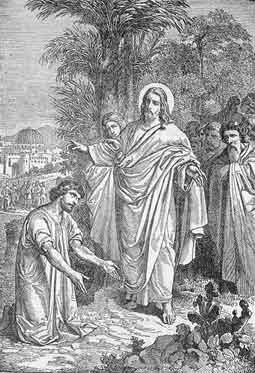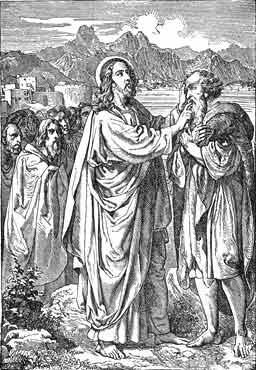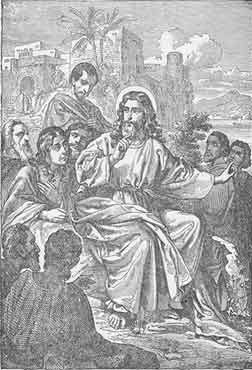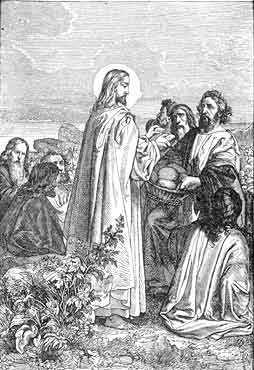posted these amusing items on Marty Haugen, who's a darling among liberal Novus Ordo parish 'musicians'.
CNS reports that Marty Haugen, Protestantism's cuckoo's egg, was named Pastoral Musician of the Year. Kewl. At least one can't blame Catholicism for Haugen - he's a former Lutheran, now "United church of Christ" member. In case you've been lucky enough to never have been exposed to this kind of music, now is time for you to suffer, too. Inclusive like I am I will extend this moving tribute beyond just Marty Haugen, and also honor other pastoral musicians. To honor them, maybe people like
Curt Jester could write some additional lyrics for these beloved classics.
(The links from the song titles link to the Windows Media audio files. To listen via Amazon audio/Real player, go to the links to the CD titles in this post)
Check out
this CD on Amazon - one can listen to samples there. It's truly a feast - Haugen, Haas and Joncas, the triumvirate of tripe, together in concert. The album's catchy title: "Come and Journey". Hoo boy. Upon hearing "
Gather Us In", I was convinced that surely "the Minna would be lost"
(referring to a popular old American tv show called Gilligan's Island, whose theme song is reminiscent of the infamous church tune) and also felt like putting on an eye patch, praising a pirate's life.
It all feels like that movie "A Mighty Wind" which makes fun of PBS's non-satirical folk concerts. There's of course the catchy (as in, might require penicillin to get rid of) "
come, Lord Jesus, reneeeeeeeeeeew the face of the earth". Then there's the irresistible
"Come and journey with me" which sounds like a rejected song from a Disney soundtrack.
In case you haven't suffered enough, here another
Marty Haugen CD. The best from 1980-84! If you ever need to get a hostage taker to surrender, you might want to blast
We Walk by Faith at him in an endless loop, the luxurious instrumentation alone guarantees success. Then there's
Taste and See, which seems to be a coffee commercial gone terribly wrong. The song "
We are many parts" is either a cry for help by someone suffering from multiple personality disorder or a threat that indeed resistance to the joy of pastoral musicians is futile, for they are many.
Be With Me is what happens when someone with a lobotomy is given a high dose of Xanax. Marshmallowy goodness.
I hope you won't be too disconsolate, but the years 85-59 aren't for sale on Amazon. But, fear not, or should I say, be not afraid,
they got 1990-1996. It may seem a whoooole lot longer to you, but the song
All Are Welcome apparently has only been around since the '90s, despite its destinct 1967 odor of faux folk. Then there's
Bread to Share with its distinct off-off-off-Broadway sound (Social Justice - The Musical).
As the Grains of Wheat brings back the more familiar choir of the brainwashed sound. I was waiting for them to start sweetly chirping "One of us, one of us, one of us."
We'll end this tribute to our Protestant singer-songwriter with another collaborative effort whose title is something we've all been asking ourselves -
How Can I Keep From Singing ! Advice would be welcome. But please, practice nonviolence. The gaping wound that is the absence of Joncas is made somewhat easier to bear by the addition of Jeanne Cotter. The first song is actually by Pete Seeger, who gave the world such classics as If I Had a Hammer - curiously enough the very sentiment the music invokes. Then, enjoy the sweetness of another classic -
You Are Mine featuring the line "Do not be afraid, I am with you". The song reminds me of "that" scene in a movie when the unsuspecting protagonist is in a small town, has just found refuge from the monsters, say in the diner, and the camera shows the locals giving one another knowing looks - you know, right before they turn into their alien selves ?
Also on this seminal recording is the song
Rain Dance, which answers the question "Just how high can a female voice go?". I'm certain that part of the song can only be heard by dogs, so be careful, there might be hidden messages such as "Dogs of all countries, unite". Then again, it might just be something re-assuring such as "All dogs go to heaven."
All You Works of God combines the age of Aquarius with some "ethnic" percussion, thus embodying the spirit of inclusiveness.
Shepherd Me Oh God is evocative of the sweetly innocent character, half Annie, half Dickensian street urchin, of a musical who sits outside at night, looks at the stars with his big eyes and breaks into song. "Can you hear me, god? A puppy pwease, a puppy pwease"
We Are Called features these immortal lyrics:
We are called to act with justice,
we are called to love tenderly,
we are called to serve one another;
to walk humbly with God!
The exclamation point really drove home the humility for me. What do you feel? Please share. Buy quick, Amazon informs us that there's only 1 CD left in store. But, be not afraid, more are on their way.
Make sure to check out
Marty Haugen's new CD - an "interfaith project centered on peacemaking" which curiously had rather the opposite effect on me. I guess I am just not ready. To be sure, the message is powerful, and the word "peace" is in 5 song titles, so you know he's serious - check out some of the songs:
Seek Truth, Make Peace, Reverence Life, which expresses the fond hope "may we walk as one with the poor and oppressed against the powers..." and there I could not understand the words - "that keep them in peas?" "that feed them the cheese?" Anyway, I'm sure it's profound. The inter-religious dialog message really is driven across powerfully in the songs
"Salaam Aleikum" (Arabic meets a jingle for a tropical resort) and
"Sim Shalom". Surely the Palestinian-Israeli conflict could be solved if they were threatened with compulsory listening to this CD.
Let us end this tribute to Catholish music by a look at this CD -
Celebrating Our Faith. Of course, when Protestant Marty Haugen celebrates "our faith" it's a bit like an Englishman walking in St. Patrick's Day Parade, but hey, I'm feeling ecumenical. This CD is quite an accurate portrait of the contemporary Catholish music scene. It even has the "
Halle Halle" Alleluia - hoo boy, the third time around the parish percussion section always got into it, it'd have been perfect but for my desire for more cowbell.
Perhaps the greatest gift Marty Haugen has given us is the ubiquitous Mass of Creation. As the Center for Disease Control and the diocesan music director will tell you, it's spreading rapidly across the country. If that won't make you attend a Tridentine Mass, nothing will. For my readers outside of the USA who are - as of now - safe from it, let me educate you, so you'll be prepared. If you hear
this,
you know that the hand holding isn't far off. Flee while you can.
And so, in closing, let me express a very ecumenical wish - may the members of Marty Haugen's new ecclesial community, the "United church of Christ",
suffer enjoy his music just as much as Catholics do.
For those who can't appreciate the beauty of this music, there's a
support group.
Quote of the Day
I took my first job as a way of keeping me from going to Africa in the Peace Corps. I had signed up but didn’t want to go because I was in love with the woman who was to become my wife. I thought perhaps I could take a job for a year until I could get married and find out what I really wanted to do. A chaplain suggested that I apply for a Catholic church job. I said I didn’t know anything about the Catholic liturgy, and he said, well, these days, nobody does—you’ll feel right at home. And he was right.
- Marty Haugen -
I swear, I did not make it up.
You can find it here.
 Pope Benedict XVI is considering a dramatic overhaul of the Vatican in order to force a return to Gregorian Chant, the medieval music that served the Catholic Church for centuries. Today, two Vatican watchers discuss what this might be more for more modern forms of music. Joining us is Damian Thompson, a leader writer for London's Daily Telegraph and editor-in-chief of The Catholic Herald; and William Berger, a librettist and author of several books including "Wagner without Fear" and "Verdi with a Vengeance."
Pope Benedict XVI is considering a dramatic overhaul of the Vatican in order to force a return to Gregorian Chant, the medieval music that served the Catholic Church for centuries. Today, two Vatican watchers discuss what this might be more for more modern forms of music. Joining us is Damian Thompson, a leader writer for London's Daily Telegraph and editor-in-chief of The Catholic Herald; and William Berger, a librettist and author of several books including "Wagner without Fear" and "Verdi with a Vengeance."




